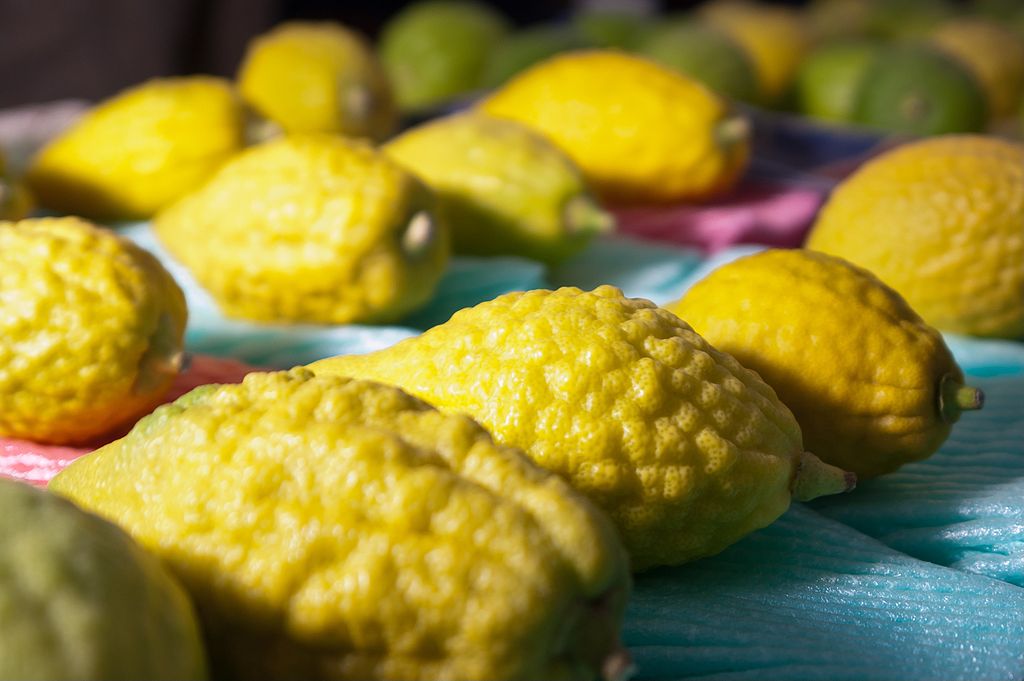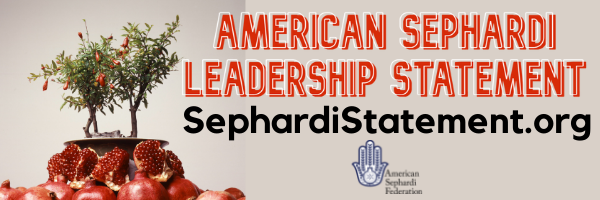

!חג שמח
From your friends at
The American Sephardi Federation
In honor of Sukkot, the ASF’s Sephardi World Weekly is pleased to present the following “Letter from the Land of Israel”:
The Chief Rabbi of Salonika and first Sephardi Chief Rabbi of Israel, Rabbi Ben-Zion Meir Hai Uziel (1880-1953), was an outstanding scholar, thinker, and leader, whose life was animated by a deep love of the Jewish tradition and the Jewish People. R’Uziel’s capacity to live simultaneously in the ethereal world of ideas and the practical reality of Jewish life in the land of Israel exemplifies the best of classic Sephardi Judaism. His combination of scholarship and public service was wonderfully illustrated by a seemingly arcane legal ruling that R’Uziel made in 1935 regarding the status of “grafted etrogim.”
What is an etrog? An etrog (known in English as a citron) is a citrus fruit, one of “the four species” of the land of Israel that Jews traditionally take to the synagogue during the week of Sukkot.
Jewish legal scholars have contended with the status of a “grafted etrog” for the past four hundred years. What happens if an etrog isn’t pure, but, instead, has been grafted onto a lemon stock? Is it permissible to use such an etrog during Sukkot?
Continue reading below…
~~~~~~~
Together, we can go from strength to strength in the New Year!

With your generous, tax-deductible donation, the ASF can cultivate and advocate, preserve and promote, as well as educate and empower!
For more information about sponsorship opportunities: email or leave a message at 212.294.8350. To donate by mail, please send a check payable to “American Sephardi Federation,” 15 W 16th St., New York, NY, 10011
Email us at info@americansephardi.org if you are interested in discussing donating securities or planned giving options with a financial professional from AllianceBernstein.
~~~~~~~
The majority of legal authorities have ruled, for a variety of reasons, that it is not permissible to use a grafted etrog. When the issue came before R’Ouziel, however, he ruled in favor of “All who buy etrogim grown in Israel, even if it is known that they were grafted,” declaring they “may rely on the opinion of those that permit them.”
What motivated R’Ouziel to deviate from the scholarly consensus by endorsing grafted etrogim as permissible? R’Ouziel reasoned:
Even though halakhically there is no law to give precedence to the fruits of Israel, nevertheless, because of the love of the land and the mitzvah of settling the land of Israel, it is a mitzvah to seek out etrogim grown in Israel.
This is in order to aid those who exert effort to develop the land among the Jewish people. Anyone who prefers etrogim grown in the Diaspora sins against his people and his land, since he weakens the position of his brethren who dwell in the land of Israel and who wish to support themselves by their labor.
R’Uziel concedes that there aren’t legal grounds for preferring fruits grown in the land of Israel. Therefore, on strictly legal grounds, it would seem to be preferable to use a pure etrog from outside the land of Israel in place of a hybrid etrog grown in the land of Israel.
However, R’Uziel further reasoned that other values supersede exclusively legal concerns, namely, “love of the land and the mitzvah of settling the land of Israel.” For R’Uziel, the meta-halakhic principle of strengthening Jewish settlement in the land of Israel guides how the law should be adjudicated.
But R’Uziel’s love of the Land wasn’t an abstract love. He considered it to be a mitzvah to seek out etrogim grown in Israel for a very practical reason:
This is in order to aid those who exert effort to develop the land among the Jewish people. Anyone who prefers etrogim grown in the Diaspora sins against his people and his land, since he weakens the position of his brethren who dwell in the land of Israel and who wish to support themselves by their labor.
As Rabbi Dr. Marc D. Angel explains in his book on R’Uziel, Loving Truth and Peace, “Rabbi Uziel… believed that it was a moral obligation of world Jewry to support the Israeli economy. Although halakhic arguments could be marshalled for and against grafting etrogim, Rabbi Uziel introduced the moral and practical issues relating to strengthening Jewish labor in the land of Israel; these conditions led him to permit ̶ and even to encourage ̶ the use of Israeli etrogim, even if grafted.” (Loving Truth and Peace, p. 103; translations are taken from the same source).
While today’s economic reality is of course different than in R’Uziel’s time—the Israeli economy is robust and growing—his ruling exemplifies the importance Sephardi leaders have attached throughout history to settling the land of Israel. What’s more, it demonstrates how a humane concern for people can shape our understanding of the Law. This is of course the Sephardi way, a way that is deeply rooted in classical Jewish sources; as the sages said, “The Torah was created for Israel,” and not the other way around (Midrash Kohelet, 1:9).
The ASF wishes our readers a joyous Sukkot holiday, ennobled by the humane love for the people of Israel and the passionate love for the land of Israel that animated R’Uziel’s whole life and that informed his ruling regarding the status of grafted etrogim.
Haj Sameah!
The American Sephardi Federation

~~~~~~~
Banner image credit: Etrogim, Market of the Four Species, Bnei Brak, Israel
(Photo courtesy of Sven Manguard/Wikipedia), 2011
~~~~~~~
Iraqi-Jewish Sukkot Piyyut

Rabbi Moshe Habusha playing the oud
(Photo courtesy of Emil Salman)
In honor of Sukkot, the great Iraqi-born payytan, R’Moshe Habusha, sings Yah et Sukkat David Takim (“God, raise up David’s Sukkah”), according to the traditional Babylonian melody.
~~~~~~~

The American Sephardi Federation invites all individuals, communities, and organizations who share our vision & principles to join us in signing the American Sephardi Leadership Statement!
~~~~~~~
Upcoming Events or Opportunities
The ASF Institute of Jewish Experience presents:
Exclusive Authors Series with Judith Roumani
Join us for this episode of our Exclusive Authors Series with Judith Roumani discussing her new book Francophone Sephardic Fiction: Writing Migration, Diaspora, and Modernity.
Tuesday, 25 October at 12:00PM EST
(Complimentary RSVP)
Sign-up Now!

About the book:
Francophone Sephardic Fiction approaches modern Sephardic literature in a comparative way to draw out similarities and differences among selected francophone novelists from various countries, with a focus on North Africa. The definition of Sepharad here is broader than just Spain: it embraces Jews whose ancestors had lived in North Africa for centuries, even before the arrival of Islam, and who still today trace their allegiance to ways of being Jewish that go back to Babylon, as do those whose ancestors spent a few hundred years in Iberia. The author traces the strong influence of oral storytelling on modern novelists of the twentieth and early twenty-first centuries and explores the idea of the portable homeland, as exile and migration engulfed the long-rooted Sephardic communities.
About the author:
Judith Roumani is founder and director of the Jewish Institute of Pitigliano, and founder and editor of the online journal Sephardic Horizons, which appears three times a year. She received a BA Honors in Spanish and French from the University of Nottingham, an MA in Latin American Studies from the University of London, and a Ph.D. in Comparative Literature from Rutgers. She has taught Spanish and Sephardic studies at the University of Maryland, College Park, and other colleges in the Washington DC area. She has also been a director of publications, professional translator, an associate editor or author of five books and a monograph, and her work has been translated into Hebrew, Italian, and French.
Click here for more about the book.
Sponsorship opportunities available:
~~~~~~~
The American Sephardi Federation, the Seattle Jewish Theatre Company, and the Sephardic Jewish Brotherhood of America present:
“ARRIVALS”
A Jewish Romeo & Juliet love story based on historical events.
A hit in Seattle, coming to New York.
(Written and Directed by Art Feinglass)
When the first Sephardic Jew arrived in Seattle in 1902, not everything went as planned. Marco Cordova, a young Sephardic Jew from Turkey, came to America to make his fortune. Bayla Keigelman, a fragile Ashkenazi girl from Russia, arrived fleeing a pogrom. Their meeting seemed written in the stars until tradition declared their love forbidden.
Sunday, 30 October at 3:00 PM EST
Tuesday, 1 November at 8:00 PM EST
Thursday, 3 November at 8:00 PM EST
Sunday, 6 November at 3:00 PM EST
Sign-up Now!
$36 Early bird discount (if purchased before October 9th)
$50 Ticket price (if purchased after October 9th)
The Center for Jewish History
15 W 16th Street
New York City

“Arrivals tells the Sephardic story with great drama, humor and warmth.”
Rabbi Simon Benzaquen, Congregation Ezra Bessaroth, Seattle, WA
“Everyone in the audience was engaged and enjoyed the show.”
Aaron Petersen, President , Temple Beth El, Tacoma, WA
“A tour de force!”
Rabbi Emeritus James Mirel, Temple B’nai Torah, Bellevue, WA
Sponsorship opportunities available:
~~~~~~~
The ASF Institute of Jewish Experience presents:
Exclusive Authors Series with Andrée Aelion Brooks and Ruth K. Abrahams
Join us for an episode of our Exclusive Authors Series with Andrée Aelion Brooks and Ruth K. Abrahams discussing her book The Remarkable Life of Luis Moses Gomez.
Tuesday, 1 November at 12:00PM EST
(Complimentary RSVP)
Sign-up Now!

About the book:
During the early days of colonial America, a number of Sephardic Jews and conversos came from the Caribbean islands to the eastern seaboard for economic opportunity. They have largely been overlooked as the stories of the later German and Ashkenazi Jewish immigrants, took over in terms of numbers and achievements. Here is the story of one of those early Sephardic settlers who came from Jamaica to the New York area in search of such opportunities.
About the authors:
Andrée Aelion Brooks is a journalist, author and lecturer specializing in Jewish history. Formerly a contributing columnist for the New York Times, she is an Associate Fellow, Yale University, and founder of the Women’s (political) Campaign School at Yale. Her award-winning books include a comprehensive biography of Dona Gracia Nasi, a Jewish leader who was the richest woman in Renaissance Europe; Russian Dance, about a Jewish Bolshevik spy; Out of Spain, a children’s program in Sephardic history. She was honored in 2013 by the Connecticut Women’s Hall of Fame.
Executive Director of the Gomez Mill House Foundation from 1999-2017, Dr. Ruth Abrahams also served as Executive Director of the Lehman College Foundation and Vice President for Advancement at Pratt Institute. Artistically, Dr. Abrahams sang professionally in New York from 1967-1980. She received an M.A. in Humanities (Japanese Studies), and a Ph.D. in Dance History from New York University, where she taught as adjunct associate professor from 1982-1996. She was a founding member and first president of World Dance Alliance-Americas, an international advocacy organization for dance.
Click here for more about the book.
Sponsorship opportunities available:
~~~~~~~
The ASF Institute of Jewish Experience presents:
Exclusive Authors Series with Sarina Roffé
Join us for an episode of Exclusive Authors Series with Sarina Roffé as she discusses her book Branching Out from Sepharad.
Tuesday, 15 November at 12:00PM EST
(Complimentary RSVP)
Sign-up Now!

About the book:
In Branching Out from Sepharad, readers will follow the history of Jewish life in Hispania, Spain, the Middle East and the Americas as Sarina Roffé links three rabbinic dynasties from the 11th Century to the present day, all with an Irish Converso Twist.
About the authors:
Sarina Roffé is a professional genealogist, editor of the journal DOROT, and founder of the Sephardic Heritage Project. She is the author of Branching Out From Sepharad (Sephardic Heritage Project, 2017), which outlines the history of Jews in Spain, the 1492 expulsion, their history in Syria, and their immigration to the Americas. She is Co-Chair of the Brooklyn Jewish Historical Initiative, and Chair of the JewishGen Sephardic Research Division.
Sarina is also the author of Backyard Kitchen: Mediterranean Salads, Backyard Kitchen: the Main Course, and a cooking app called Sarina’s Sephardic Cuisine, available in the Apple Store, as well as hundreds of articles. Sarina presents often at IAJGS Conferences and has completed over a dozen genealogies, through her genealogy consulting business, Sephardic Genealogical Journeys.
Click here for more about the book.
Sponsorship opportunities available:
~~~~~~~
ASF Broome & Allen & ADL Collaborative for Change Fellow Isaac de Castro presents:
Entre Diasporas: Telling the Latin-American Jewish story. Contando la historia judía latinoamericana

Tell your story. Cuenta tu historia.
We’re looking for first-generation Latino Jews in the United States who immigrated because of political and social turmoil. Jews of Sephardic descent from Colombia, Cuba, and Venezuela that now reside in the Miami area will be given priority, but others are welcome to apply as well.
Fill out this form to be considered as an interviewee for this project. After you’ve submitted, we will be in touch promptly to set up a preliminary phone call.
Click here for more information.